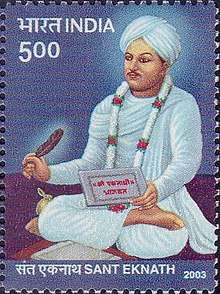Eknath
Eknath (c. 1533 – c. 1599)[1], commonly known as Sant (saint) Eknath was an Indian Hindu saint, philosopher and poet. He was a devotee of the Hindu deity Krishna and is a major figure of the Warkari tradition. Eknath is often viewed as a spiritual successor to the prominent Marathi saints Dnyaneshwar and Namdev.

Biography
Precise details of his life remain obscure. It is generally believed that Eknath lived during the latter three-quarters of the 16th-century. He was born into a Deshastha Brahmin family to Suryanarayan and Rukmini at Paithan. His father probably held the title of Kulkarni and kept financial accounts. His ancestors are thought to be descendants of the ancient sage Vishwamitra and worshippers of the Hindu deity Ekvira. [1]
His parents died while Eknath was young. He was then raised by his grandfather, Chakrapani. His great-grandfather Bhanudas was another revered saint of the Warkari sect.[2][3] Eknath was a disciple of Janardan Swami who was a devotee of the Hindu deity Dattatreya.
Eknath's samadhi shrine is located at Paithan near the Godavari river. Celebrations commemorating Eknath are held every year around the month of March at Paithan. [4]
Literary contribution
Eknath's writings include a variation of the Hindu religious text Bhagavata Purana, known as Eknathi Bhagavata. [5] He also wrote a variation of the Hindu epic Ramayana, known as Bhavarth Ramayan. He also composed Rukmini Swayamwar Hastamalak, a literary piece comprising of 764 owee (poetic metre) and based on a Sanskrit hymn of the same name.
His other literary works include Shukashtak (447 owee), Swatma-Sukha (510 owee), Ananda-Lahari (154 owee), Chiranjeewa-Pad (42 owee), Geeta-Saar and Prahlad-Vijaya. He introduced a new form of devotional melodies called Bharood and wrote nearly 300 of them.[5]
See also
References
Citations
- Ganesh Vasudeo Tagare (1994). Eknath. Sahitya Akademi. p. 4. ISBN 9788172014568.
EKNATH : A BIOGRAPHICAL SKETCH* (A. D. 1533–1599). A reference to the Marathi Vangmaya Kosh (A biographical dictionary of Marathi writers) shows that there were three authors called "Eknath" and seven authors who used the mudrika (Pen- name) "Eka-Janardan" used by our author Eknath. Eknath was a Rigvedi Deshastha Brahmin, a follower of the Ashvalayana Sutra. His Gotra was Vishvamitra. His family deity was Ekaveera Devi (or Renuka). His family lived at Paithan, ...
- Novetzke (2013), pp. 141–142
- Schomer & McLeo (1987), p. 94
- George Michell (1 May 2013). Southern India: A Guide to Monuments Sites & Museums. Roli Books Private Limited. p. 115. ISBN 978-81-7436-903-1.
- Keune, Jon Milton (2011). Eknāth Remembered and Reformed: Bhakti, Brahmans, and Untouchables in Marathi Historiography. New York, NY, USA: Columbia University press. p. 32. Retrieved 9 March 2016.
Bibliography
- Novetzke, Christian Lee (2013), Religion and Public Memory: A Cultural History of Saint Namdev in India, Columbia University Press, ISBN 9780231512565
- Schomer, Karine; McLeo, W. H. (1987), The Sants: Studies in a Devotional Tradition of India, Motilal Banarsidass, ISBN 9788120802773
External links
| Wikimedia Commons has media related to Eknath. |
| Wikimedia Commons has media related to Varkari. |
- Eknath - A Translation from Bhaktalilamrita by Justin E. Abbott (1927) at archive.org
- Shri Eknathi Bhagwat (Marathi) at archive.org